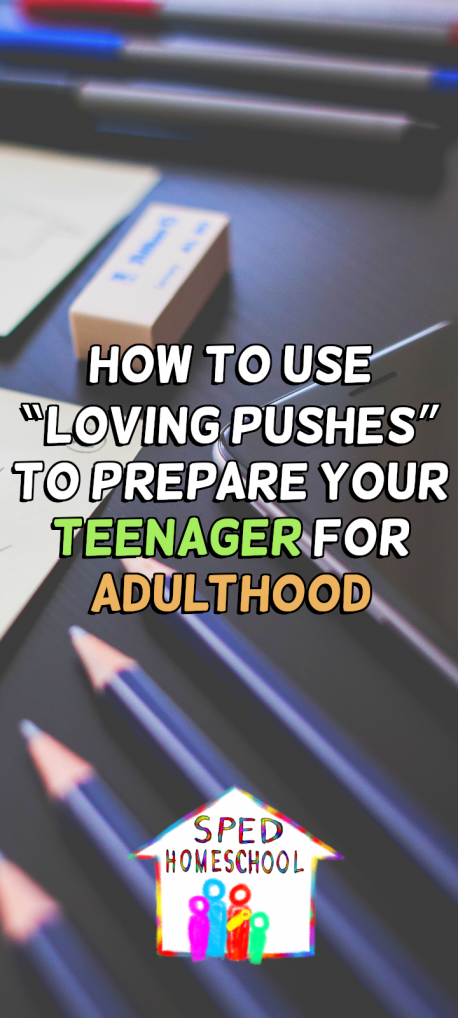
By Mary Winfield
You have heard about Temple Grandin, right? If not, study up! She is amazing. During a time where children with autism were institutionalized, her mother refused to give up on her even when doctors told her Temple would never speak or function independently.
Because of her mother’s persistence, Temple now has her Ph.D in Animal Sciences and works world-wide doing autism advocacy. If you want to learn more about her life, HBO did an excellent movie (it is also free to watch on Amazon Prime). She has written several books, but the one I read most recently is called The Loving Push with Debra Moore as her co-author.
This entire book is dedicated to helping parents help their children with high functioning autism learn to become independent and successful adults. There is so much good information in this book, I highly encourage parents of teens or pre-teens to read it. It discusses dealing with depression in teens with autism and dealing with video game addictions. It also talks about preparing teenagers to drive. It follows several different families with their experiences and lessons.
The part of the book that I want to focus on in this article is preparing teenagers for their post high school lives. In, The Loving Push, they interviewed a college professor who had worked with many different students on the spectrum, and he gave 4 areas where he sees the most struggle when students come to his college: household and personal care, using independent organizational aids, asking for help, and keeping a stable mood.
Household and Personal Care
The professor reference in the book The Loving Push said that most of these teens do fine with household chores and personal care when they are at home because their parent reminds them. Their parent will tell them it is time to shower, but then doesn’t teach them how often they need to shower or teach them to look for signs of dirty/sweaty skin, greasy hair, or body odor as indicators that they need to shower. Teaching them how often to shower (and giving them examples of when to shower more frequently ex: if you are involved in sports or physical exercise) will help them be able to duplicate it on their own.
The same goes for household chores. They may not notice when something needs to be done, but explaining things to look for or even telling them how often chores are typically done will give them concrete guidelines to follow on their own.
Independent Organizational Aids
Sometimes we try to teach too many things at once. Stepping back and thinking about a lesson’s goal and focusing on the goal instead of trying to group multiple skills will help a child learn quicker. Sometimes we may just need to focus on making a list of things to do and how to decide what to do next.
Talk about deadlines and consequences for not meeting deadlines. The ability to prioritize oftentimes is more important than what is actually on the list. Learning to prioritize and complete tasks is something parents often do for children with autism in setting schedules and routines. Helping them to master this skill for themselves is a necessary skill if they are going to be successful on their own. We can do this by having them help us create their homeschool curriculum and plan out the day and week. Talk with them about making a goal and then setting up steps to reach that goal. These are life skills that will follow them forever.
Asking for Help
The college professor they interviewed also said he saw so many students who could have done the assignments if they had asked for a little help, but they didn’t think to reach out and ask. Instead, they would try to accomplish the task on their own, and when they hit a roadblock, their conclusion reached was they just couldn’t do it. They opted to leave the assignment undone because asking for help wasn’t something they were used to doing.
Parents of autistic children often offer our help their child when he/she is struggling instead of teaching the process of asking for help. Another way to work on this skill is to enlist the help of a mentor for your child. This person becomes someone they learn to reach out to for help and guidance that isn’t constantly around them. This will further help them to practice the skill of asking for help instead of giving up on something.
Stable Mood
Having a positive mindset and reacting proportionately to situations can sometimes be a struggle for our children. One tip discussed in the book is to help them know how to duplicate good behavior and a positive mindset by giving specific and positive feedback. Temple says saying things like, “You are so kind” won’t hold very much meaning for teens on the spectrum. Saying, “Helping me with the dishes was so kind. It made me feel happy and proud of you” instead will help them to know what constitutes being kind, how it makes someone else feel, and incentive to repeat the behavior.
Furthermore, helping a child with autism remember that one failure or setback isn’t permanent and doesn’t mean they can’t be successful in the future is important. Reminding them of past successes when they suffer a setback and talking about solutions to their current problem will help them learn to persist through a struggle. If they struggle in one area, showing them their whole life is not a failure by reminding them of the areas they accel is also important. Be sure to show them strengths and weaknesses in other people as well.
“The Loving Push”
The title of the book explains to us how we need to approach preparing teenagers to be adults. Our kids are more likely to just want to stay in their routines and scripts instead of venturing out and trying new things. That means that we have to be the ones who give them a push out of their comfort zone and make them try new things. Giving them these pushes in a loving way so they know they have a safe place with lots of support will help give them the confidence to try new things in the future and transition into adulthood successfully.
Did you benefit from this article?
Would you consider a small donation to support the ongoing work of SPED Homeschool?
Click Here to Donate Today

